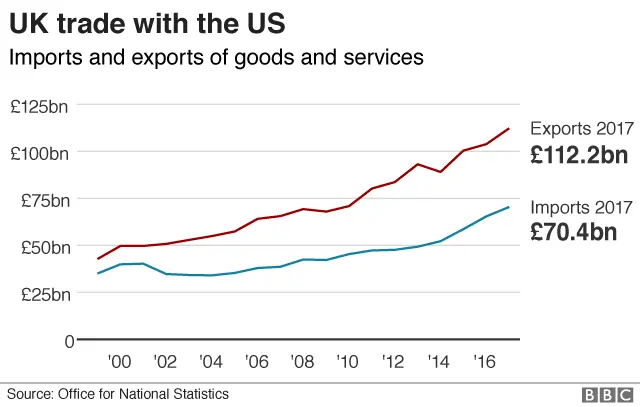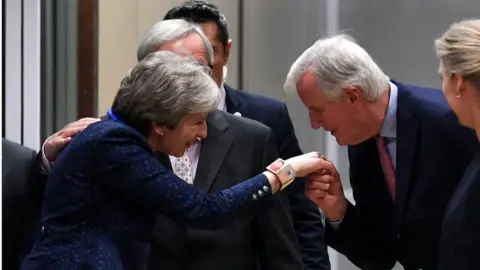Reality Check: Is Trump right about the Brexit deal?
![BBC Donald Trump saying: Sounds like a great deal for the EU. Right now, if you look at the deal, they [the UK] may not be able to trade with us.](https://ichef.bbci.co.uk/news/480/cpsprodpb/AE9D/production/_104510744_trump_trade_quotepic.png.webp) BBC
BBC"Sounds like a great deal for the EU," is a pretty broad statement.
But President Trump was talking in particular about the prospects for future trade agreements.
"Right now, if you look at the (Brexit) deal," he said, "they (the UK) may not be able to trade with us, and that wouldn't be a good thing."
Of course, that shouldn't be taken literally - it doesn't mean no trade at all.
But as long as the UK remains in a transition period after Brexit, or in a temporary customs union, it will not be able to implement its own free trade deals, cutting or removing tariffs on goods, with the United States or any other third country.
'America first'
That much is clear, but trade deals aren't just about tariffs. They are also about rules and regulations (known as non-tariff barriers) which are often more important.
And from an "America-first" perspective, it's fair to assume that the president thinks Theresa May's Brexit deal makes it more likely that the UK will stay fairly close to the EU in the long term, by following the same (or very similar) regulations in various sectors of the economy.
That is a key point. Because the closer the UK stays to the EU's common rules and standards, the more difficult it will be for it to move closer to the rules and standards followed in the United States.
We're talking here not just about examples which come up regularly, such as chlorine-washed chicken or hormone-treated beef (broadly speaking, both are allowed in the US and not in the EU), but also about industries such as chemicals and pharmaceuticals.
 Getty Images
Getty ImagesMany big businesses in the UK want to stay close to all those EU rules (its regulatory framework) because the EU is a huge consumer market right on their doorstep.
And they tend to follow the EU rules for their global operations because that simply makes things easier.
The numbers are also instructive here. Last year the UK exported £274bn of goods and services to the rest of the EU and imported £341bn. The figures for trade with the United States were £112bn of exports and £70bn of imports.

So, the EU will remain the UK's most important trading partner for some time to come. And if the president was hoping Brexit would mean a more decisive break between the UK and the EU, he may be disappointed. Hence, "a great deal for the EU".
There is genuine competition in this field between the United States and the European Union.
The EU may not be a military or diplomatic superpower, but it is a regulatory superpower.
That means one of the big choices the UK will have to make in its negotiations on post-Brexit trade agreements is which regulatory and legal orbit it chooses to operate in.
It's not an absolute "either-or" decision, but the UK will have to lean one way or the other.
The non-binding political declaration on future UK-EU trade, approved by EU leaders on Sunday, makes this clear.
 EPA
EPAThe EU is insisting on various "level playing field" conditions to ensure that the UK cannot gain a competitive advantage by continuing to have privileged access to the EU market without following its rules.
The political declaration says the level playing field should cover "state aid, competition, social and employment standards, environmental standards, climate change and relevant tax matters", and a separate statement issued by the leaders of the EU27 emphasises that they will "demonstrate particular vigilance" to ensure that these conditions are followed to the letter.
The declaration also recognises that the UK will develop an independent trade policy in the future. But it stresses that if the goal is to have frictionless trade with the EU, that will depend on how closely aligned the UK remains with the single market and the customs union.
We're back to the unresolved argument about the right balance between economic access and sovereignty.
So where does that leave the UK's future trade relationship with the US? Downing Street points out that there have already been five working-group meetings to discuss the matter.
But this may not be quite the Brexit that Donald Trump had in mind.


